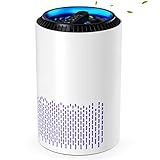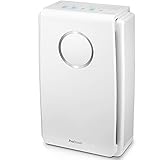Nobody likes or wants bad air. Poor air quality can lead to concentration problems and headaches and can also be bad for your health in the long run. If you think ventilation alone is enough, think again. Pollen and other particles also get into the house when airing in summer. Although these are not harmful to health, allergy sufferers will certainly not be enthusiastic. With an air purifier you always have good air and the pollen or dirt in the air is also filtered. For this reason, air purifiers are also becoming increasingly popular. In this post, we will introduce you to some highly recommended air purifiers.
The best air purifiers
Here we present the best air purifiers according to Amazon. These bestsellers were based on sales figures and positive reviews. So if you’re still undecided, or want to join the masses, here’s some good inspiration. You will find air purifiers in all different price ranges here. Then we tell you the most important thing you need to know before you buy.
Air Purifier buying guide
In the air purifier guide, we briefly tell you the most important things you should know before buying an air purifier. We answer the most frequently asked questions.
Do air purifiers work?
Yes, air purifiers work very well. – however, an air purifier is unlikely to remove or neutralize all of the offending particles in your home. But the air is significantly improved. An air purifier can act as a complement to a filter and other strategies to get rid of the following particles.

Allergens
An air purifier can work in conjunction with a HEPA (High Efficiency Particulate Air) filter, the latter of which is best known for trapping airborne allergens.
Mold
Indoor mold particles can be particularly dangerous for people with asthma and other lung diseases. To a certain extent, however, air purifiers can help get rid of mold in the air. However, if a wall is already covered with mold, the air purifier will no longer help.
Smoke
Air purifiers equipped with filters can also remove smoke in the air. The tobacco smell is neutralized in this way. However, air purifiers cannot completely eliminate the smell of smoke. However, the odor is neutralized much more quickly (in conjunction with airing).

This is how air purifiers work
Air purifiers essentially work by disinfecting the air, which can contain pollutants, allergens, and toxins. They are the polar opposite of essential oil diffusers and humidifiers, which add particles to the air in the room.
Air purifiers also behave differently than filters. While filters only remove particles, purifiers can also disinfect the air.
There are differences in which air purifier can remove which particles. When buying, pay attention to which particles can be eliminated in each case. Particular
Another option is an air purifier that emits negative ions and helps attract positive ion particles in the air so they are neutralized. The disadvantage of this option is the possibility of ozone emissions.
Were you able to find a suitable one using our air purifier recommendations? Which one did you choose and what was your experience? Please leave us a comment.

























